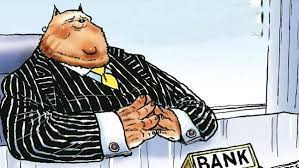This Unholy Mess
Welcome

Unless you’ve been living under a mortgage-free rock, you’ve seen and heard plenty of rants about the failure of Silicon Valley Bank and the current shakiness that seems to be showing up everywhere in the banking system. How did this happen? Is it interest rate hikes, low capital requirements for mid-size banks? The Pandemic? Risk mismanagement? Joe Biden’s character flaws?
The fascinating thing about the crisis is that though “experts” might quibble over the importance of its imminent causes, the foundation of this mess isn’t different from the one that caused many of the financial crises in recent U.S. history, including the Moby Dick of them all, the Financial Meltdown of 2008.
That foundational truth is this: The financial sector is not a responsible partner in our society. It is, in fact, an outlaw. The financial sector sees its job as trying to make money—as much and as quickly as possible, regardless of consequences. We’ve seen this thread through our recent history, from junk bonds and “credit default swaps” to the “shadow banking sector” and—everybody’s favorite–cryptocurrency. The financial sector has proven again and again that they will not hesitate to drive the car off the cliff, as long as many of them can throw themselves clear before we the saps, the muppets, take the inevitable fall.
This might seem like a harsh judgement, but once we can accept it, the way forward becomes clearer. And that way is: Regulate the living, breathing hell out of the entire financial sector. Do it constantly, diligently, fiercely, knowing that our financial friends are like addicts going through mom’s wallet, looking for a few dollars for their next fix. They can’t help themselves, so it’s up to us to help them out. We must see to it that all financial institutions with more than $50 billion in assets have at all times sufficient liquidity and capital reserves to undergo stress tests that will prove their viability under “worse case” conditions.
There will be spirited objections, of course. Cold turkey is a painful prospect for the financial sector. Some of their favorite harrumphing will sound like this: It’s terrible to regulate us too much because you will stifle the natural creativity and dynamism of a “free market.”
To that I say: Stuff it. The nation’s tax payers cannot afford the “dynamism and creativity” of your “free market.” These freedoms are not yours to have, because you, the financial geniuses, the creative free spirits, never have to clean up your own mess. You are naturally happy to be in the casino because you are never playing with your own money.
Now that we know what needs to be done, how to go about it? The answer is as obvious as it is fraught. The government must do the regulating. Only the power of the federal government will have a shot at achieving the kind of stability that will prevent these disasters.
The situation is fraught because asking government to regulate the financial sector is like asking beggars to stand tall in holding the feet of their benefactors to the fire.
A perfect case study of this truth is the aftermath of the 2008 Crisis. As the horror of what financial institutions had done became clear, Congress scrambled to close the barn door after the horse had fled. It passed the famous Dodd-Frank Act in 2010, which indeed forced financial institutions to rein in their ruinous, irresponsible behavior, a course of action they took only because the entire nation was seething with rage at the idea that taxpayer dollars were bailing them out, while many of those same taxpayers lost savings, retirement money, and even their homes.
What we know now is that within days of Dodd-Frank’s passage, bank lobbyists were at the doors of legislators, looking for ways to chip away at the new law. It took eight years to achieve a breakthrough, but in 2018, at the behest of many bank CEOs (including that of Silicon Valley Bank), Congress rolled back major parts of the law. In an act of the sickest cynicism, they called the new law “The Dodd-Frank Wall Street Reform and Consumer Protection Act.”
Insert vomit emoji here.
This was a bi-partisan action by Congress, primarily because money is bi-partisan. Donald Trump, who had called the original Dodd-Frank a “job killer,” was overjoyed.
So here we are, knowing federal legislators must support the needed regulation and oversight, but also knowing they can be easily corrupted by banking money. The answer lies with us and our votes, of course. We all need to take a personal pledge never to vote for any senator, any representative who will not put in place and maintain the strongest regulation of the financial sector.
Raise your right hand.